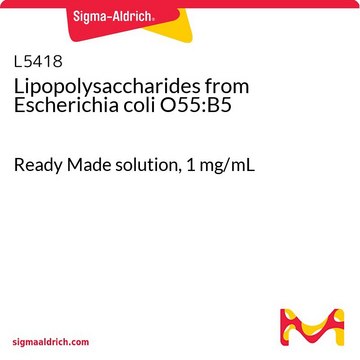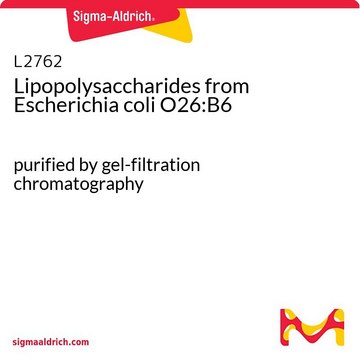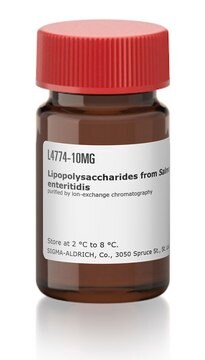L4524
Lipopolysaccharides from Escherichia coli O55:B5
purified by ion-exchange chromatography, TLR ligand tested
Synonym(s):
LPS
Sign Into View Organizational & Contract Pricing
All Photos(3)
About This Item
Recommended Products
biological source
Escherichia coli (O55:B5)
Quality Level
form
lyophilized powder
purified by
ion-exchange chromatography
impurities
<1% Protein
<1% RNA
color
white to yellow cast
solubility
water: soluble
shipped in
ambient
storage temp.
2-8°C
Looking for similar products? Visit Product Comparison Guide
General description
This product is extracted from E. coli serotype O55:B5 and purified by ion exchange. The source strain is CDC 1644-70. The LPS O55:B5 has been used to stimulate human peritoneal macrophages at 1 ng/mL and to stimulate equine peritoneal macrophages at 1-100 ng/mL.
Application
Lipopolysaccharides (LPSs) are characteristic components of the cell wall of Gram-negative bacteria. LPS and its lipid A moiety stimulate cells of the innate immune system by the Toll-like receptor 4 (TLR4), a member of the Toll-like receptor protein family, which recognizes common pathogen-associated molecular-patterns (PAMPs).
Biochem/physiol Actions
Lipopolysaccharides (LPS) are localized in the outer layer of the membrane and are, in noncapsulated strains, exposed on the cell surface. They contribute to the integrity of the outer membrane, and protect the cell against the action of bile salts and lipophilic antibiotics.
Preparation Note
The product is soluble in water (5 mg/ml) or cell culture medium (1 mg/ml) yielding a hazy, faint yellow solution. A more concentrated, though still hazy, solution (20 mg/ml) has been achieved in aqueous saline after vortexing and warming to 70-80 oC. Lipopolysaccharides are molecules that form micelles in every solvent. Hazy solutions are observed in water and phosphate buffered saline. Organic solvents do not give clearer solutions. Methanol yields a turbid suspension with floaters, while water yields a homogeneously hazy solution.
Other Notes
To gain a comprehensive understanding of our extensive range of Lipopolysaccharides for your research, we encourage you to visit our Carbohydrates Category page.
related product
Product No.
Description
Pricing
Signal Word
Danger
Hazard Statements
Precautionary Statements
Hazard Classifications
Acute Tox. 2 Oral
Storage Class Code
6.1A - Combustible acute toxic Cat. 1 and 2 / very toxic hazardous materials
WGK
WGK 3
Flash Point(F)
Not applicable
Flash Point(C)
Not applicable
Choose from one of the most recent versions:
Already Own This Product?
Find documentation for the products that you have recently purchased in the Document Library.
Customers Also Viewed
Arij Faksh et al.
Pediatric research, 79(3), 391-400 (2015-11-06)
Antenatal inflammation and preterm birth are associated with the development of airway diseases such as wheezing and asthma. Utilizing a newborn mouse model, we assessed the effects of maternal inflammation and postnatal hyperoxia on the neonatal airway. Pregnant C57/Bl6 dams
Up-regulated TLR4 in cardiomyocytes exacerbates heart failure after long-term myocardial infarction.
Li Liu et al.
Journal of cellular and molecular medicine, 19(12), 2728-2740 (2015-08-21)
It remains unclear whether and how cardiomyocytes contribute to the inflammation in chronic heart failure (CHF). We recently reviewed the capacity of cardiomyocytes to initiate inflammation, by means of expressing certain immune receptors such as toll-like receptors (TLRs) that respond
Ryoichi Ishibashi et al.
Scientific reports, 6, 25955-25955 (2016-05-18)
Kidney diseases including diabetic nephropathy have become huge medical problems, although its precise mechanisms are still far from understood. In order to increase our knowledge about the patho-physiology of kidney, we have previously identified >300 kidney glomerulus-enriched transcripts through large-scale
Hun-Way Hwang et al.
Neuron, 95(6), 1334-1349 (2017-09-15)
Alternative polyadenylation (APA) is increasingly recognized to regulate gene expression across different cell types, but obtaining APA maps from individual cell types typically requires prior purification, a stressful procedure that can itself alter cellular states. Here, we describe a new
Siroon Bekkering et al.
Clinical science (London, England : 1979), 133(10), 1185-1196 (2019-05-16)
Atherosclerosis is a chronic inflammatory disease that has its origins in early life. Postnatal inflammation exacerbates atherosclerosis, but the possible effect of intrauterine inflammation is largely unexplored. Exposure to inflammation in utero is common, especially in infants born preterm, who
Our team of scientists has experience in all areas of research including Life Science, Material Science, Chemical Synthesis, Chromatography, Analytical and many others.
Contact Technical Service





